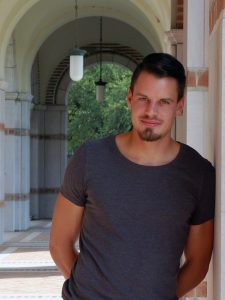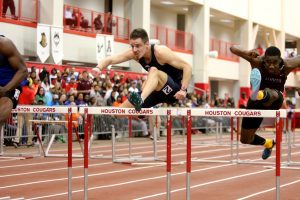CS Senior Filip Drozdowski knows about hurdles – both on the track and in his CS projects. Unlike the standardized obstacles he leaps in his dash around a specific length of track, his CS project hurdles are invisible and unknown –until he hits them.
“As much as I’d like to plan for my CS homework the same way I schedule my track and field workouts and competitions, programming just doesn’t adhere to a schedule,” he said. “You never really know how long its going to take or what’s going to go wrong.”
Drozdowski began running track 10 years ago in Poland. “I’m from Torun, where the famous mathematician and astronomer Nicolaus Copernicus was born. I ran for a couple of years on the junior national team and did well enough to go looking for scholarships to help cover some of my expenses and perhaps leave me a little pocket money.”
While he was reviewing a list of local scholarship opportunities, he began recognizing a different pattern in the names. “There were a lot of track and field athletes who had received college scholarships, and that caught my eye,” said Drozdowski.
He planned to go abroad for college, but had expected to go somewhere in the United Kingdom. By the time he graduated from high school, he said their public tuition had increased dramatically and he did not care to take out student loans.
So he contacted a manager who had helped a lot of Polish athletes find a good match with academically rigorous universities offering athletic scholarships. “He’d sent about 100 people to the United States,” said Drozdowski, “ and he helped me set up my portfolio, then I started receiving some offers. The biggest reason for coming to Rice was its strong academics and location in the heart of a metropolitan city.”
Earlier, Drozdowski had taken a high school computer science course and learned to program in C++ through a program launched by Nicolaus Copernicus University. “They wanted to improve standards across the European Union and worked with high school math and science teachers to connect promising students with weekly online lectures and algorithmic challenges. I started working on them on my own, sometimes ignoring my other homework (especially biology) to finish an algorithmic challenge. Luckily, my teacher supported my efforts.”
Then Drozdowski changed schools.
He said, “It was my senior year of high school but I really wanted to work with Pawel Raczka, who was training athletes for the junior national team in Warsaw, so I changed schools. Since I was switching schools in the last grade of high school, I had little flexibility. Most schools didn’t want students to join only for the last year and the school I got into didn’t offer computer science classes in the last grade.”
 When he arrived at Rice, he was still interested in computer science but had lost his confidence. CS Professor Devika Subramanian helped him find it.
When he arrived at Rice, he was still interested in computer science but had lost his confidence. CS Professor Devika Subramanian helped him find it.
“Dr. Subramanian was teaching COMP 140 when I met her. She helped re-inspire my passion and helped me regain my confidence. She actually had more confidence in me than I had in myself,” he said.
Subramanian also offered Drozdowski his first summer internship, a research project linked to her COMP 390 course. “The summer after my freshman year, she hired me to work on an exploratory-style research project in machine learning. I had no idea what I was doing, but she said, ‘the difference between this job and your class is I don’t give you any project specs – you just figure out what needs to be done and do it.’ So I jumped in.”
She gave him a few pointers, links, and recommendations and encouraged him to participate in Kaggle Competitions to learn more about machine learning and data science. Although he got to know her better by working with her that summer, he was still surprised when she reached out to him his sophomore year as he was facing surgery.
“I’d been injured and was scheduled for day surgery,” he said. “She asked me if I had anyone to take me and bring me back. Of course the university’s athletic medical assistant was handling all of that for me, but I was amazed that a CS professor would offer to go out of her way –put her own busy schedule on hold– just to drive me to surgery and back.”
Following his injury and surgery, Drozdowski was unable to compete for half of a year but the extra time provided him an opportunity to work in more courses.
“I feel extremely privileged to have been offered the chance to complete my degree over five years on a full scholarship,” said Drozdowski. “So I made the most of every moment. It’s important to take courses outside your field, and not just the ‘easy A’ courses that will meet a distribution requirement.”
He recommends other CS students take history, business, and economics courses. “Even if it challenges your GPA, take classes outside your comfort zone. Those classes teach you how to think and also how to communicate. One of my hardest and interesting, multidisciplinary classes was on consulting and my team included a Psychology major, an English major, and a Civil Engineering major. We worked with a nonprofit focused on the visual and performing arts. None of us even used the same vocabularies and that made it difficult to exchange ideas.
“It is easy to talk to other CS majors, we all use the same language. But communicating ideas to someone who doesn’t ‘speak CS’ can be disastrous. Learn from that. Go take classes that help you learn and improve your overall understanding of how to think from a different perspective and work together.”
Drozdowski also talked about commitment and priorities. Every day for ten years, he has always been ‘in training’ – working out, eating, recovering, competing. He said the purposeful recovery an athlete needs after a practice is just as important as the practice or competition performance. So during his daily recovery periods, Drozdowski would sit and pound through his CS code. But he never felt he had enough time to do everything.
“It isn’t about coordinating deadlines, but about balancing twin passions. If you want to do it all, you have to make your lifestyle about those priorities. A lot of CS students may work together pretty late, and I’ve done it more times than I should have. Each time I paid for those late hours the next day. I put in my workout or competed in my meet, but I wasn’t giving my best performance.”
He found it unsettling to turn in homework or compete in a meet without giving his best effort. “It is unsatisfying to do something at 50%. It’s not acceptable. If you don’t see good performance, you wonder, should I cut something? But you don’t really have time to give it much thought. You’re on a tight schedule, intensive training, little sleep –you just do it.”
Reflecting on a problem and taking the time to go further, dig deeper is one of the aspects he most anticipates as he begins working as a software engineer for Delphix after graduation. As a student athlete, he never felt he had time to meditate on a problem or solution, and there was never time to go back and review a solution he’d submitted because there were always new deadlines.
“The most satisfying internship I completed was with Delphix last summer,” said Drozdowski. He was treated to the full stack experience, and participated in meetings with customers just like the rest of his engineering team.
“We scheduled a meeting with our customer (who had requested the feature I worked on) at the beginning of the summer. We looked at their customers’ use cases and explored the workflow their customers follow. I built my project based on those conversations. This time, there was adequate time to think about the problem, ponder the solution, and tinker with it. At the end of the summer, my project was complete and we had another meeting to demo it to the customer. My manager was thrilled with the customer’s positive reaction.”
That opportunity to contemplate and approach problems from multiple perspectives while communicating with customers and team members is one of the reasons Drozdowski accepted an offer to return to Delphix. He looks forward to moving to San Francisco following graduation –and after his last track and field competition in late May. It won’t be the last hurdle he leaps.
